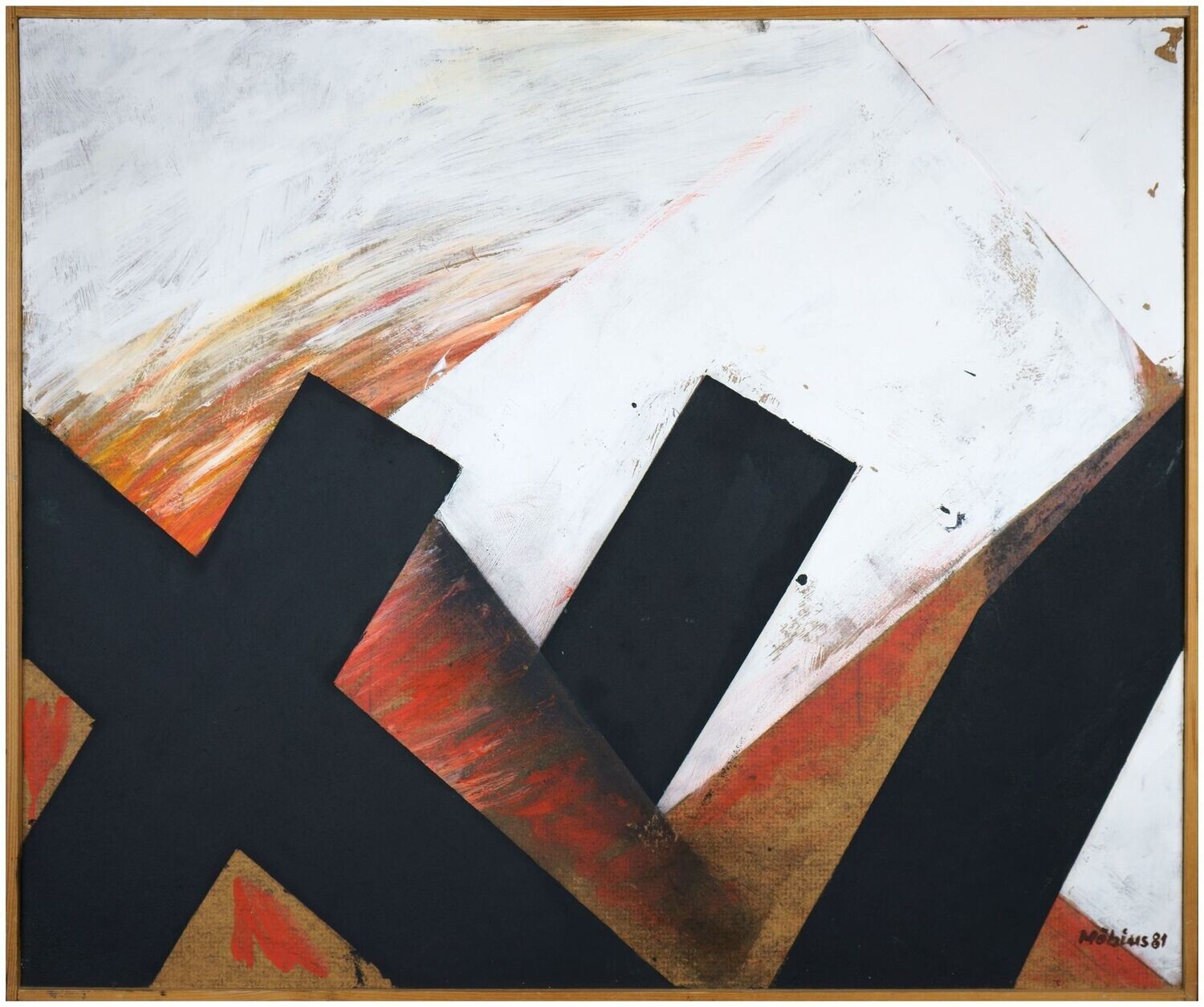Möbius, Jürgen (*1939 Großenhain), Black form surfaces on red painterly ground, 1981
Jürgen Möbius(*1939 Großenhain), Black form surfaces on red painterly ground . Oil on hardboard, 50 x 60 cm, 51 x 61 cm (frame), signed "Möbius" and dated "[19]81".
- Small paint chip in upper right corner, otherwise good condition. Gallery frame with slight signs of wear.
Exposé as PDF
- The Double Origin of Painting -
In the painting black, optically dominant forms can be seen, which in their arrangement at right angles to each other have a proto-architectural character. They are, so to speak, always already given original forms. At the same time, however, the forms are surfaces of color, and thus genuine painting. In order to make the painterly character of the painting clearly visible, Jürgen Möbius has applied red-toned strokes that have preserved the brushstroke. These are traces of an act of painting.
The diagonal layers of red strokes merge into the upper white area, which oscillates between brushwork and homogeneous flatness, while the central white field, into which a black bar protrudes, has a decidedly planar character.
The sharp contrast between the autonomous black surface forms, reminiscent of Kasimir Malevich, and the free brushstroke, which is not bound to any motif, creates an enormous pictorial tension, which is conveyed by the white, but at the same time is intensified by the virulent black-and-white contrast.
In addition to the tense contrast of form and color, there is also a contrast between the dynamic of the brushstroke and the static of the black surface forms, whereby the diagonal alignment of these forms also gives the static a dynamic, while at the same time the layered brushstrokes have something static about them.
Added to this structure of tension is the fact that the painting ground, the unprepared hardboard, is clearly present as such in the picture. In this way, it becomes clear once again that we are not dealing with an autonomous cosmos of form and color, as in Suprematism, but with a painting created by the artist's hand.
With this work, Jürgen Möbius explores the possibilities of painting and thematizes painting in terms of its twofold origin, the trace of the guided brush and the painterly form, which gains its independence precisely by absorbing the brushstroke into itself.
About the artist
From 1959 to 1965 Jürgen Möbius studied painting at the University Institute for Art and Work Education in Mainz. He also studied philosophy and art history at the University of Mainz. Afterwards he worked as a freelance artist in Mainz.
At first, Möbius created material reliefs and installations, then, around 1974, he turned increasingly to conceptual art and added cinematic means. During this phase he wrote the manifesto-like essay "Principles of Supranatural Landscape" (1979).
From 1981 on, Möbius concentrated on painting and searched for artistic ways to "treat intellectual and sensual perception equally in the fusion of representational and abstract pictorial elements" (Wolfgang Zemter). He found inspiration on his study trips to Thailand and Sri Lanka.
"The pure painting of Jürgen Möbius flows through us as a timeless expression of memory and energy, ploughing our perception and bringing us the happiness of seeing authentic, immovable form.
- Philippe Büttner
Selection of solo exhibitions
1969 Galerie Würzner, Düsseldorf / Galerie Gurlitt, Mainz
1972 Städtische Galerie, Mainz
1973 Galerie Schloss Ringenberg Rathaus, Kleve
1974 Röderhausmuseum, Wuppertal
1976 Galerie Glasing, Osnabrück / Städtische Galerie, Herne
1977, 1997, 2004 Märkisches Museum, Witten
1979 Studio M, Bamberg / Staatstheater, Darmstadt
1980 Galerie Stolànovà, Wiesbaden / Mittelrheinmuseum, Koblenz
1982 Galerie Dornhöfer, Mainz
1984 Galerie Neumühle, Schlangenbad
1985 Landesmuseum, Mainz / Kunstverein, Ludwigshafen / Nassauischer Kunstverein, Wiesbaden
1986 Museum, Bochum / Galerie der Stadt Iserlohn
1987, 1990 Galerie Klaus Kiefer, Essen
1987, 2000 Galerie Ulrike Buschlinger, Wiesbaden
1988 Kunsthalle Darmstadt
1988, 1992, 1996, 1999 Galerie Leonhard, Basel
1992, 2002 Galerie Zulauf, Freisheim
1994 Galerie Remy, Vallendar
1995 Sendezentrum des Zweiten Deutschen Fernsehens, Mainz
2001 Collegium oecumenicum, Bamberg / MVB Forum für Kultur und Wirtschaft, Mainz
2006 Adam Gallery, London
Selection of group exhibitions
1969 ‘International Graphic Arts’, Galerie Dalléas Bordeaux, Paris
1975 ‘Deutscher Künstler-Bund’, Dortmund
1979 ‘Man and man’s Images’, Märkisches Museum Witten
1980 ‘Love-Dokuments of our Time’, Art Hall Darmstadt and Art Association Hannover
1982 ‘Work - Progress – Position’, Nassau Art Association Wiesbaden
1983 ‘Principle Hope – Utopic Aspects in Art and Culture of the 20th Century’, Museum Bochum
1986 ‘Selfportraits’, Gallery Klaus Kiefer Essen
1987 ‘The Dying and Death’, Gallery Klaus Kiefer Essen
1989 ‘Where are You, Revolution – Freedom, Liberty, Egality, Fraternity to-day’, Museum Bochum 1990 ‘Flight – a Problem within the Memory of Man’, Kunsthalle Darmstadt ‘Art and War 1939 – 89’, House of Cultures Berlin
1991 ‘Material and Form’, Pillnitz Castle Dresden and Pfalz Gallery Kaiserslautern
1995 20 Years Exhibitions, Chrämerhuus Langenthal, Schweiz
1998 ‘Works on Paper’, Klaus Kiefer Gallery Essen
2000 ‘Acquisitions 1900 – 2000’, Mittelrhein-Museum Koblenz
2001 ‘Strange Pictures’, Klaus Kiefer Gallery Essen
2002 ‘10 Years Buschlinger Gallery’, Buschlinger Gallery Wiesbaden
2004 ‘Eternal Space – Pictures and Sculptures’, Dome of Bamberg
2005 Art Fair Chicago, Adam Gallery, London
Selected Bibliography
Mittelrheinisches Landesmuseum (Hrsg.): Jürgen Möbius - Neue Bilder, Mainz 1985.
Kunstverein Darmstadt (Hrsg.): Jürgen Möbius. Bilder 1985 - 1988. Kunsthalle Darmstadt, 26. Juni - 14. August 1988. Red. Dorit Marhenke, Lyrik Marcus Schiltenwolf, Düsseldorf 1988.
Gabriele Prusko (Hrsg.): Jürgen Möbius. Mit Texten von Philippe Büttner und Ralph Mieritz, Basel 1992.
Wolfgang Zemter (Hrsg.): Jürgen Möbius - Aktuelle Arbeiten. Märkisches Museum der Stadt Witten, Bönen 1999.
Wolfgang Zemter (Hrsg.): Jürgen Möbius. Flieger in meinem Zimmer und Beruhigte Zone, Bönen 2004.
Dama Gallery (Hrsg.): Jürgen Möbius, London 2014.

